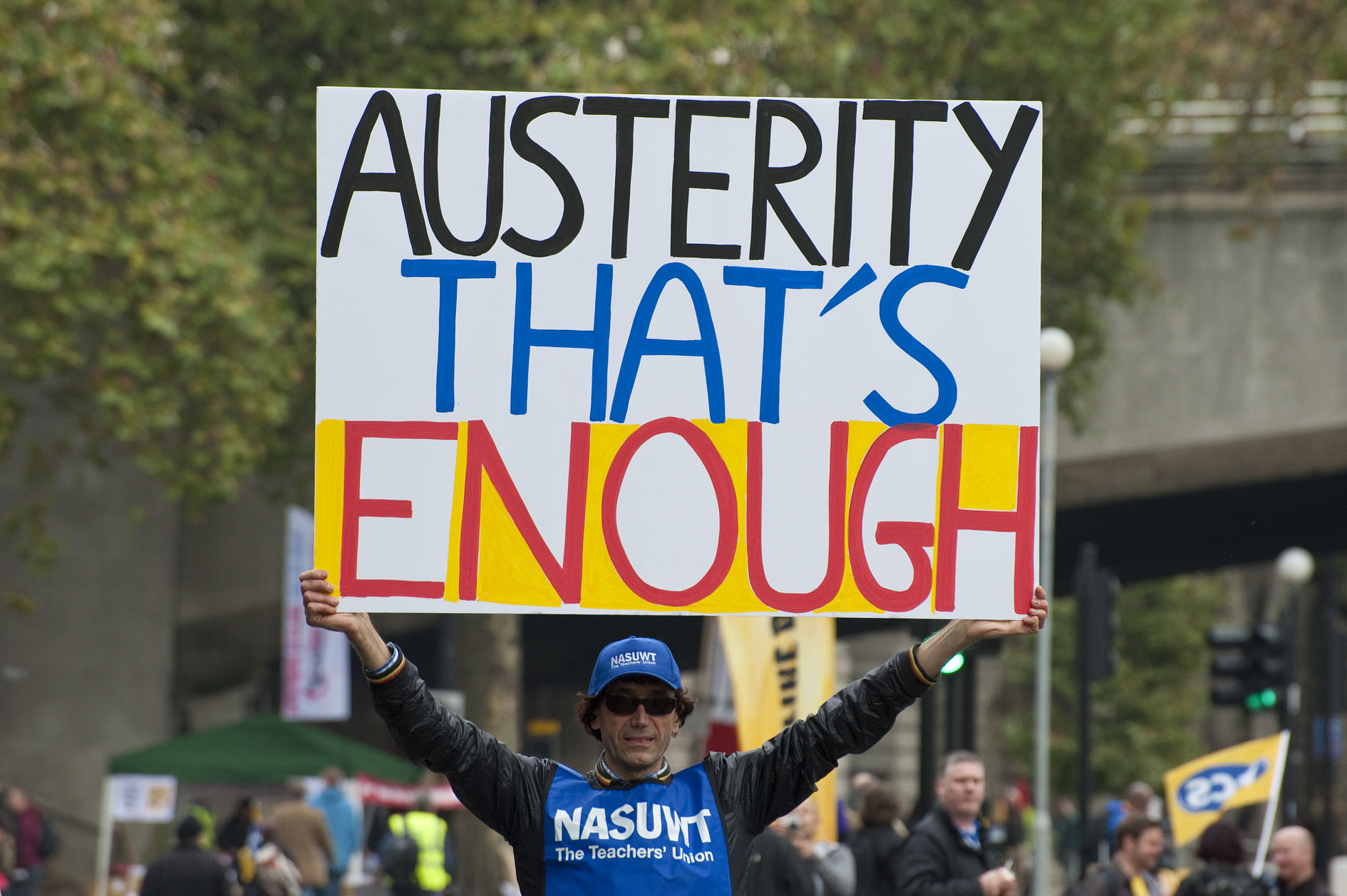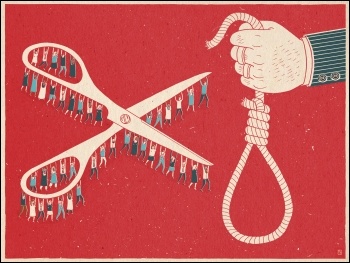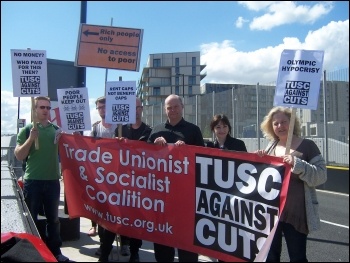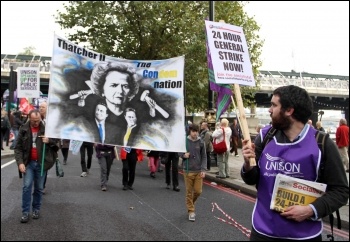2013: Prepare for a mighty battle against deeper cuts
Peter Taaffe, Socialist Party general secretary
The coming year, like 2012, will be one of intense struggles by the working class in Britain, Europe and the world.
Five years into the most devastating capitalist economic crisis since the 1930s, the ruling classes continue to unload the burden for this onto the shoulders of the working class.
Because of inadequate and faulty leadership, working-class people have paid a terrible price: in mass unemployment numbering 18.5 million in the European Union, a slashing in living standards and the appearance of poverty that the present generation have up to now only been able to read about in books like George Orwell’s ‘The Road to Wigan Pier’.
‘Civilised’ Britain now experiences some of the conditions once confined to the neo-colonial world with the appearance of food banks, where middle-class people who have fallen on ‘hard times’ rub shoulders with the destitute in the lengthening queues for the bare essentials of food.
Guardian writer Zoe Williams suggests never mind, “be optimistic”, down with pessimism and always look on the bright side.
She is correct in seeking to counter the government’s mantra that “there is no alternative” to their cuts’ programme.
She’s also very good in debunking the “myths of the government” in relation to fraud in the benefit system, which accounts for 0.7% of the total bill. Cameron uses this to stigmatise all those forced onto benefits.
In a sense, Zoe Williams expresses admirable sentiments if the intention is to instil a sense of hope and resistance to the onslaught of the bosses against all past gains of the working class.
But she undermines her case by then asserting that “Britain is not Greece, our economy is stronger”. The implication is that this country cannot go down a similar path to Greece.
This is a severe case of wishful thinking. Spain, Portugal and even Italy, although much stronger economically, have experienced similar problems to Greece with an economic slump together with massive and rising unemployment.
The capitalists in these countries also declared that they ‘were not Greece’. Yet their economies have been plunged into crisis with debts, inherited from the ‘boom’, that is crippling them like Greece.
Today, the economic and political fate of each country in Europe is linked together as never before. Intensified globalisation ensures that not just Europe, but the world is now bound together with iron hoops.
If Greece was forced out of the euro, it could trigger a spiral of decline which would intensify the already catastrophic crisis and drag the whole of Europe into an economic abyss.
If Spain, Portugal and Italy were to follow, it has now been estimated that the cost of the default by 2020 would be the equivalent of 180% of eurozone annual gross domestic product (€17 trillion!).
Britain is not far behind; it is presently Greece in slow motion! Yet the collapse of the euro could speed up the process enormously.
Hence the nervousness of Cameron about the fate of the euro, despite the fact that Britain is not a member of the eurozone.
Working class strength
There is not an atom of pessimism in this. We socialists and Marxists are very confident in the ability of working-class people – especially when they have a farsighted leadership and a fighting mass party behind them – to not only resist the capitalist offensive but to provide an alternative to outworn and failing capitalism, in the form of a democratic socialist planned economy.
Proof of their combativity is to be seen in the titanic general strikes, one of the highest forms of struggle of the working class, in Greece, Portugal, Spain, India, Romania and other countries of Eastern Europe.
And here in Britain we saw the huge October demonstration of 150,000 marching in opposition to the austerity coalition Con-Dem government and with the major trade union leaders calling for a 24-hour general strike.
Yet austerity – planned poverty – will not only be continued but worsened, with 80% of the planned cuts of the government yet to be implemented.
There is therefore every likelihood – with the required militant leadership – that 2013 will see a heightened movement of the working class in Britain.
This, of course, partly depends on the national leadership of the trade unions giving the necessary lead in preparing for one-day general strike action.
But if they don’t act then a movement from below can develop, as in South Africa with the marvellous movement of the miners who came out on strike in opposition not just to the bosses but their own union leaders.
New Labour local authority leaders in the North of England have warned that “civil unrest” could take place if the government continues to force through their cuts agenda.
These council leaders and others could avoid this if they refused to act as agents of the coalition by not carrying through cuts and instead lead a mass movement of opposition which could defeat the government on this issue and undoubtedly prepare its downfall.
Economic decline
Despite Zoe Williams’s blandishments, British capitalism faces a bleak outlook, which means a terrible future on the basis of the capitalist system for the working class, above all for young people.
The blizzard of doom-laden facts and figures that have recently filled out the economic sections of the capitalist press amply demonstrates this.
British capitalism is reaping the rewards of a completely short-sighted policy over decades, not just years.
The refusal to invest in industry, which in turn resulted in industrial collapse, was highlighted by us in literally dozens of articles over the last three decades.
Indeed, Thatcher colluded in the deindustrialisation of Britain as a means of weakening the working class in the aftermath of the 1984-85 miners’ strike.
The scale of the collapse is indicated in a recent report by the European Federation of Employers. It pointed out that capital replacement in the UK has fallen more than in any other European country since 2005: “The UK is turning into an old-style Third World country … with low pay growth for most workers below managerial level, widening pay differentials and poor levels of capital investment”.
The economy is bumping along the bottom, with growth “invisible to the naked eye outside of London”. Stagnation, combined with a dose of inflation, and decline, is the best-case scenario.
The Economist characterises this as “the stuck society”, a semi-paralysed zombie-type economy. Growth will probably be no more than 0.1% in 2012 and will be little more this year.
And this is without the threat of ‘headwinds’ – code for the deepening of the worldwide economic capitalist crisis which is severely affecting Britain.
The government loudly proclaims the success of its strategy for creating jobs and new businesses. The Economist, on the contrary, talks about “businesses without employees … business creation is flat”.
Sales of homes are at half the level they were in 2006, while even right-wing think tanks warn the government that house building is in a crisis, with the number of houses built the lowest since the 1920s.
This, in turn, impacts on the young, already confronted by mass unemployment, and now compelled to live at home with their parents.
Britain has begun to mirror Japan, where half of those between 20 and 34 are ‘fridge raiders’ in their own parents’ homes. In Britain, the proportion is one in three for men and one in six for women!
This at a time when the next governor of the Bank of England, Mark Carney, will receive a whopping £250,000 housing allowance, on top of his mega salary of £624,000 – more than double what the current governor, Mervyn King, received for presiding over an economic collapse.
This just adds to the growing hostility – class hatred – which working people feel for the rich.
This extends to the government, which is seen increasingly as the protector of spivs and economic racketeers.
Russian billionaires are handed residency after five years for a minimum price tag of £1 million – with the qualifying period reduced to two or three years for £10 million or £5 million respectively – and then engage on a property-buying orgy, which in turn drives up all property prices throughout London.
One consequence is that Thatcher’s ‘property owning democracy’ lies in ruins, with only a minority in London now owning their own house and the majority at the mercy of uncontrolled moneygrubbing landlords.
These supposed ‘trustees’ of capitalism are in a fog about the workings of their own system, let alone possessing any remedies for solving the crisis.
They have been like a cork bobbing on the waves in an economic tsunami. The Socialist did foresee the inevitability of a crash at a certain stage, although no one could predict the timing or the severity of this crisis.
The debt-fuelled boom which preceded this – a massive injection of credit – extended the ‘growth’ cycle but then deepened and lengthened the crisis when it finally struck.
On her recent visit to the Bank of England, the Queen – who has been drawn into a more and more openly political role, even attending the Cabinet – received a belated ‘explanation’ from one of the Bank of England’s top economists as to why the crisis was not foreseen.
According to him, the City “was complacent” and in any case, crises were “a bit like earthquakes and flu pandemics in being rare and difficult to predict”. In other words, the crisis of capitalism is like a natural phenomenon.
Marxist analysis
Marxism rejects such ‘voodoo economics’. Marx pointed out that crises are man-made; they are an inevitable product of a system based upon production for profit and not for social need.
Capitalist ‘overproduction’ – unknown in previous economic systems – in a world crying out for continued economic growth to satisfy the obvious needs of the poor and dispossessed, is an economic absurdity and totally avoidable. This is on condition, of course, that the capitalist system is abolished.
Before departing from the Bank of England, the Duke of Edinburgh asked: “Is there another one coming? …
“Don’t do it again”. But the capitalists cannot help “doing it”, presiding over crises and slumps again and again.
So too with speculation and gambling, as is shown by the examples of fraud even during this world crisis.
This is organic to capitalism itself, like inhaling and exhaling to the human body. However, with age, the organism becomes weaker.
The booms becoming less effective in solving the problems created by the previous crisis while crises and slumps appear more often and drag out.
It is possible that the current crisis could be drawn out, similar to the depression in the 19th century from 1873 to 1896. But there is no “final crisis of capitalism”.
Capitalism can always find a way out, through the destruction of living standards, and ultimately by curtailing and possibly destroying the democratic rights and organisations of the working class.
In this way, an unstable equilibrium can be established for a time. But as sure as night follows day, a new economic crisis will be prepared, as the history of capitalism itself has shown.
The conclusion arising from this should be that we should organise to mobilise working people for the replacement of the system by one that can use the full potential of the productive forces. This is only possible on the basis of democratic socialism.
In this period the working class is receiving brutal lessons in the character of capitalism, which puts the lust for profit by the bosses before all ‘humane’ considerations.
To the delight of the bosses, “a supply of people able to work for less than the cost of living gives parsimonious firms a convenient pool of temporary workers” (The Economist).
In other words, a reserve army of unemployed, as predicted by Karl Marx, has returned in Tory/Lib Dem Britain.
The plentiful supply of cheap labour obviously pleased the Bank of England’s chief economist, Spencer Dale, who praised the labour market’s “extraordinary flexibility …
“The pay packets of the average worker bought 15% less than they would have done had the pre-crisis trend continued”.
Unable to contain his delight at this impoverishment of the working poor, he continued: “One of the most striking – and indeed encouraging – features of the performance of our economy since the financial crisis is the falls in real wages that have been achieved without a very sharp rise in unemployment”.
A low-wage economy alongside a mass and stagnant pool of unemployed, to be used as a weapon against those fortunate to have a low-paid job, is the future that is mapped out by the strategists of capitalism for the working class.
At the same time, a reduced standard of living for the great majority of the population is all that is offered.
Already, Britain has slipped down two places to sixth in the European league table of living standards.
But this is just the beginning with Cameron and King promising more of the same with their predictions that ‘austerity’ will last for at least another decade.
Greater poverty
And of course the economic crisis will bear down greatest on the poorest households who have been hit by soaring food prices, even according to government figures.
These reveal that the consumption of every major nutrient has fallen in the last four years. Cash-strapped families have bought less lamb, beef, fish, fruit, vegetables, potatoes and alcoholic drinks, but more bacon, pork and cheese.
Is it therefore little wonder that rickets – the disease of poverty associated with the 1930s – has returned to Britain?
There are claims that the deficiency of vitamin D associated with this disease is due to lack of sunshine.
This may be a factor, but it is not the whole picture, as families scrimp on food. Teachers have increasingly found that they have to deal with hungry children who come to school without food or money, with the teachers themselves moved to feed them out of their own pocket.
Even the high Tories of the Daily Telegraph report: “Ordinary families will be more than £1,000 a year worse off after George Osborne’s autumn statement …
“Families in work will be hit hard by the decision to increase child benefit and working age benefits by just 1% a year”.
The reason why the Telegraph is flagging up opposition, particularly to the withdrawal of child benefit, is because their readers, better off middle-class families, will have child benefit withdrawn next year.
More than half of those responding to a survey believe “that we are not in this together”, as George Osborne has ceaselessly asserted.
He was given his answer by the booing which greeted his appearance at the Paralympics: “Why did 80,000 people boo George Osborne? Because that’s the maximum capacity of the Olympic Stadium.” (Andrew Rawnsley, Observer).
When Thatcher was in power, we argued that the economic wasteland she helped to create would lead to her being compared to a latter-day Genghis Khan.
This has now been confirmed from an unexpected source. Michael Heseltine, for many years Thatcher’s partner in crimes against the working class – the man who presided over the complete destruction of the mining industry in Britain – now concludes: “government appears like villains descending like Mongol hordes on the most vulnerable, leaving community welfare like bleeding stumps”.
But this government is continuing Thatcher’s work, even going further than she dared. Recently released papers from her government in the 1980s show that even she rejected the complete dismantling of the ‘welfare state’ when it was suggested by her Chancellor, Geoffrey Howe. But Cameron and Clegg now intend to implement Howe’s programme to the letter.
This is a moment in history similar to the early 1920s when the capitalists, through the Geddes report, proposed savage cuts in the living standards of the working class, which led to the 1926 general strike.
A seemingly irresistible force in the form of a government determined to face down the working class at all costs met an immovable object, a working-class ready to resist.
The only reason why the government of the time came out of this conflict victorious was because the trade union leaders refused to carry the strike – which was growing relentlessly each day – through to a conclusive victory.
This government will not retreat, unless it is confronted by the most determined and broad mobilisation of the working class ready to use the full power of the labour movement.
New Year of more cuts
It is clear that British and world capitalism offer no way forward for the working class. Therefore, in 2013 the Con-Dem government will serve up the same toxic dish of further cuts in living standards, deeper cuts in national and local government budgets and attacks on the organisations of working people.
Over one million jobs will have been cut from the public sector if just some of the scheduled cuts are carried out.
Nor can salvation be expected from the private sector: “An extra 200,000 people in Britain may be without a job by this time next year, according to the think tank IPPR, and youth unemployment may again rise above one million” (Guardian).
Education Minister Michael Gove is riding roughshod over the objections of parents and teachers in the relentless drive to establish academies.
We don’t have to speculate what the result will be; we have the evidence provided by our sister organisation in Sweden – Rättvisepartiet Socialisterna – where the Swedish equivalent of academies have been operating for some time.
They show just where Gove’s plans will lead. They point out that Sweden and Chile are the only countries where profit-making schools are financed with taxpayers’ money.
In Sweden this has led to a catastrophic drop in the quality of education. A handful of companies in Sweden – some of them hedge funds – have raked off record profits of over $20 million from running private schools funded by the state.
Within a few years this will also be the picture here, and not just in education, but also in health, conditions of work, etc.
This will be accompanied with a vicious attempt to nullify the effectiveness of the trade unions. Cabinet Office minister Francis Maude, together with Eric Pickles, the local government minister, is already attacking ‘facility time’ for trade union representatives.
Yet within the last few days it has been revealed in the Independent that “the government is paying staff from powerful firms including energy giants and a leading bank to work at the heart of Whitehall”.
This ‘facility time’ will undoubtedly be used to enhance the agenda of the energy giants and the banks to squeeze even further those who are suffering from ‘fuel poverty’.
The long-term consequences of Maude’s attacks could rebound on the bosses and their government by producing more hardened, militant and younger fighters in the workplace and the unions.
But if these measures are not fiercely resisted now and defeated, in the short-term this could undermine resistance to the government’s plans.
Trade union ‘brake’
For too long, some of the trade union ‘generals’, like Brendan Barber at the head of the TUC, have been a massive brake on the working class.
At its annual congress in September the TUC decided on a one-day general strike. Yet Barber, together with some right-wing union leaders like Dave Prentis of Unison, has clearly been trying to frustrate any attempt to implement this decision.
His brand of ‘responsible’ trade unionism was clearly summed up in his departing message on his retirement from the TUC when he described the TUC as an ‘institution’, a pillar of the capitalist state.
The trade unions in their foundation and their aims are nothing of the kind. They are or should be implacably opposed to the bosses – and particularly today when the working class confronts capitalist forces, red in tooth and claw – in the struggle for a living wage, against unemployment, etc.
It is for this reason that the organising of a one-day general strike assumes paramount importance, linking together the struggle against the cuts, with pay, pensions and conditions of work. The anti-trade union legislation is an obstacle but not an insurmountable one.
It is true that the anti-union laws in this country are among some of the most repressive in Europe. But that does not mean to say that workers in other European countries do not have laws and restrictions limiting and in some cases prohibiting strike action.
Even in Greece, Spain and Portugal anti-union laws are in place – although not as restrictive or with the potential for financially damaging unions as in Britain.
But this has not prevented Greek workers from engaging in 18 one-day strikes and four 48-hour strikes against their government.
For a one-day general strike
Firstly, a common date should be agreed – with the majority of trade unions committed to this – while the ballots for such action can be on different issues.
For instance, pay is now a burning issue for the great majority of workers with inflation exceeding the level of wage increases.
There is also the question of conditions at work – for instance the horrific workload of teachers, the question of low pay, etc. In the final analysis, where there is a will there is a way.
We cannot allow the onslaught of the Con-Dem government and the capitalists to go unanswered. Forward in 2013 to a mighty one-day general strike, which properly organised will shake this government to its foundations!
Also Ed Miliband in his Christmas message once again shows just why New Labour does not represent working class people.
By calling for the unemployed to accept any job, no matter how low paid, that is offered to them he is doing the Tories’ job for them.
This is to signify an acceptance of a slave’s charter, that a further impoverishment of the poor and the working class is inevitable and cannot be resisted.
The struggle of the cleaners on London Underground and the Tyne and Wear Metro gives the lie to this with a demand for a living wage.
This ‘Labour leader’ dares not agree with this for fear of alienating ‘moderate’ public opinion. The reality is that the mass of British people, not just trade unionists, would enthusiastically endorse this campaign.
Only a new mass party of the working class can adequately voice the growing mass opposition towards the government.
This opposition is increasing and is helping to provoke splits and divisions in the coalition. With their standing in the polls reduced to an all-time low, the Liberal Democrats could be forced by the social effects of further cuts to cut adrift from the coalition. 2013 could see the defeat of this government and a new general election, particularly if the trade union movement organises decisive action.
Despite his lack of programme, Miliband could be pushed into power. But New Labour has no answers to the burning problems that confront the working people of Britain.
Even right-wing Labour MPs have voiced doubts about the long-term consequences for such a government.
The failure of New Labour could pave the way for an even more right wing Tory government at a later stage.
Therefore it is urgent that in 2013 no time must be lost in preparing for a mighty battle on the industrial front and in creating a new party, which will provide real leadership to the working class in the big struggles that will take place.
This version of this article was first posted on the Socialist Party website on 1 January 2013 and may vary slightly from the version subsequently printed in The Socialist.














